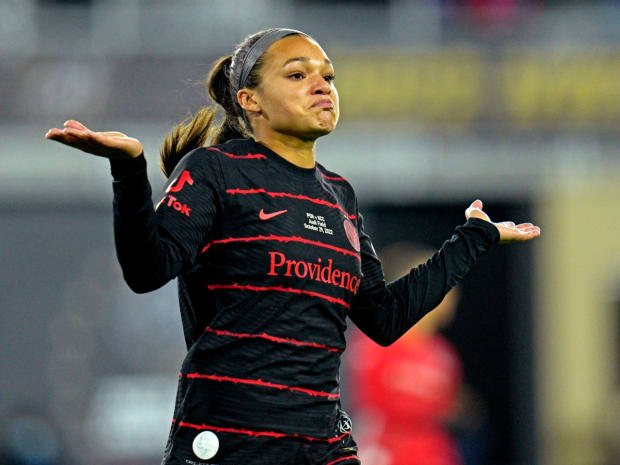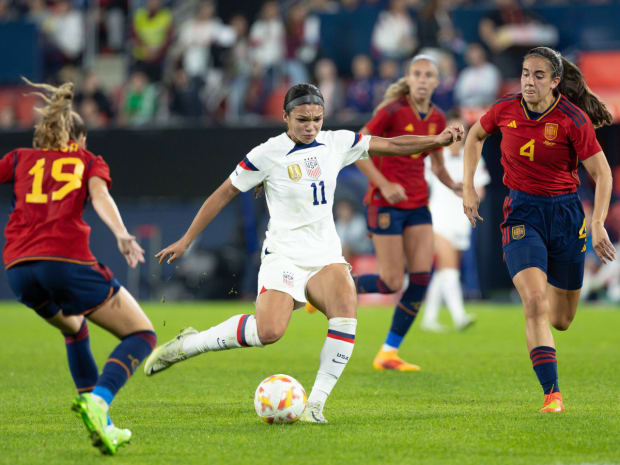Having conquered the NWSL with a championship and the title of MVP, the young Thorns star is ready to take on the pressure that awaits the USWNT.
Sophia Smith has long been touted as the next big thing in U.S. soccer, and, after a landmark 2022 campaign, the 22-year-old’s moment has officially arrived.
In the NWSL final in late October, Smith beat Kansas City Current keeper Adrianna Franch one-on-one and buried the go-ahead goal for the Portland Thorns—and then flashed an instantly iconic, meme-worthy Michael Jordan shrug. It was an unforgettable moment for the league’s 2022 MVP—a celebration she says she didn’t plan, but one that put her critics on notice.
“I try not to look at it, but it’s always going to be there,” Smith says of the online debate surrounding her award, with her being the youngest player in history to receive the honor. “It’s hard to avoid, but … there always will be conversations, arguments [and] debates, and I wanted to make it a point that I really, truly believed that I deserved to win MVP this year.”
Smith’s confidence is backed by an impressive stat line: She notched 14 goals, one fewer than Golden Boot winner Alex Morgan, and three assists through the regular season. The former Stanford star’s ascension to the top of U.S. professional soccer materialized at warp speed. She lifted the league trophy just two years after being selected first by Portland in 2020, the first teenager to be selected in the NWSL draft, and is emerging as a mainstay on the U.S. women’s national team. Smith is no longer the future of the sport—she is the now.
Watching Smith compete, it’s evident that she thrives when given the latitude to run at players, take opponents one-on-one and be creative on the ball. Her liberated approach also creates space off the ball for herself and her teammates, opening up channels despite defenders’ fixation on her.
“How does she create space for herself? Because the field gets small for her very quickly,” says Thorns coach Rhian Wilkinson of Smith, who signed a three-year extension with the club. “You give her a sniff at the net, [and] she makes something out of nothing.”
Developing confidence in a club environment is one thing, but playing with gusto and taking risks on the national team—where a player is constantly competing for a roster spot—is an entirely different beast. Smith welcomes the pressure that comes with donning the crest.

Jessica Rapfogel/USA TODAY Sports
“The national team environment, especially as a young player, can be very stressful, as it should be. It’s the national team,” Smith says. “It’s the best players in the world, and every single day in training camp is a fight to make your mark and to hopefully win a spot on the next roster.”
While no USWNT roster spot is ever a foregone conclusion, Smith is about as sure of a lock as possible ahead of the 2023 World Cup. Along with Mallory Pugh and Morgan, Smith has emerged as part of the starting front line, with the Portland star currently leading the goal-scoring charge for the USWNT, tallying 10 in 2022.
Smith has often seen herself as a pure goal scorer, but how she thinks about her game and contributions is starting to shift. In USWNT coach Vlatko Andonovski’s system, wingers are asked to do a decent amount of defensive work, pinning back the opposing team’s fullbacks and pressing when necessary. “I definitely evolved a lot in the way I view what a good game vs. not a good game is,” she says. “I would say even earlier this season, if I didn’t get a goal or an assist, I felt like it wasn’t my best game. Even if I was connecting and doing the things I normally do, I would kind of base it off of that.”
Smith’s role on the USWNT has evolved along with her growing presence on the pitch, despite being one of the youngest players on the squad. Youth has been the name of the game for Andonovski after he brought a roster with an average age of 30.8 years to the Tokyo Olympics, where the United States faltered to a disappointing bronze-medal finish. With fresh faces, however, come growing pains, and the USWNT has endured plenty of hurdles as of late, including losses to England and Spain in the squad’s early-October European swing. The team had not lost two games in a row since 2017.
“I think this group is pretty new and young. We really haven’t had a lot of time to build that chemistry, whereas other countries have,” Smith says, reflecting on the England and Spain contests. “I think it’s just having that patience to build those relationships, to gain that chemistry and figure out the style of play and put all those pieces together.”
Smith began her professional career at a moment of tumult, with the NWSL—and the soccer world more broadly—confronted with long-ignored issues of racial equity, abuse and neglect. And this year, Portland’s 2–0 triumph over the Current capped off a tumultuous campaign, one that started with a coach in Wilkinson and a new general manager, Karina LeBlanc. The change came after a 2021 story by The Athletic uncovered troubling details about Paul Riley’s tenure as Portland’s coach, as well as the front office’s handling of abuse accounts pertaining to Riley.
In response to last year’s leaguewide reckoning, U.S. Soccer deputized former acting attorney general Sally Yates to investigate abuse claims that had been made regarding several NWSL coaches. The report, released in October, highlighted conflicting accounts from Thorns’ leadership (specifically, former president of soccer Gavin Wilkinson and president of business Mike Golub, who were fired by the club last month) into why Riley was fired in 2015 and why the coach was given a positive review by the club, despite former player Mana Shim filing a complaint against him.
With the Thorns representing the league in its marquee match, the club’s inclusion in the Yates report and the growing calls from fans for owner Merritt Paulson to sell the team were thrust into the spotlight. Smith says that having to answer for misconduct in the league, while essential to address, grew tiresome. “It does start to get hard when the players feel like it’s our job to speak to the media about topics that we don’t necessarily have the answers to,” she says. “That can get really hard, and, honestly, it’s just not our responsibility or not something we want to do, especially when we have the most important game coming up.”
Through it all, balance has been the answer for Smith, looking to veteran players like Crystal Dunn and Becky Sauerbrunn for guidance on managing off-field affairs while finding joy on the pitch. Smith venerates USWNT teammates Dunn and Sauerbrunn, commending the way they use their voice and platform. Smith has even fostered a close relationship with Dunn’s newborn son, Marcel, with Dunn calling the star striker “babysitter No. 2.” Smith attributes her natural bond with Marcel to her childhood, growing up in a house where her mom ran an at-home daycare. “I was like 12, 13 walking around the house with one baby on one hip,” Smith says.
Beyond her impressive “baby whisperer” skills, as Dunn puts it, Smith also credits her parents with instilling in her a “baseline confidence” that she says helped her develop a strong sense of self at a young age. That certitude serves as Smith’s secret weapon on the pitch, allowing her to compete with a sense of freedom critical to her creative and fearless style of play.
“I have always played better when I am not stressed, not putting pressure on myself and just having fun, so that still applies to this day and even in this league and even with the national team,” Smith says. “If I am feeling good and confident and in a good mental space, that’s when I play my best.”

IMAGO/ZUMA Wire
With the NWSL championship added to her growing trophy cabinet, Smith is looking ahead to the USWNT’s upcoming friendlies against Germany. Unlike many who have sounded the alarm bells following the squad’s string of lackluster performances, Smith is not ready to hit the panic button just yet.
“I think there are a lot of people who are maybe concerned, maybe doubting us, maybe thinking this is the end or the downfall of the national team, and that’s not the case at all,” she says.
Is the current USWNT ready to win the World Cup right now? No. But Smith says that’s not a bad thing. She emphasizes the importance of peaking at the right time. No one wants to reach the apex months early. Instead, she says, she is energized by the group’s potential, describing the team’s current identity as “consistent growth.”
Much is being made of the USWNT’s quest for a World Cup three-peat, but the Australia-and–New Zealand–hosted tournament will also serve as Smith’s introduction to the world’s biggest stage, embodying the future of the women’s game. For now, Smith is taking it one day at a time.
“I think being the best, I don’t know if it is really an end goal or a point that you can reach,” she says. “It’s just consistently bettering my game and growing my game into the best Sophia Smith I could possibly be.”
More Soccer Coverage: